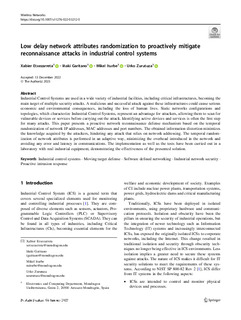| dc.rights.license | Attribution 4.0 International | * |
| dc.contributor.author | Etxezarreta, Xabier | |
| dc.contributor.author | Garitano, Iñaki | |
| dc.contributor.author | Iturbe, Mikel | |
| dc.contributor.author | Zurutuza, Urko | |
| dc.date.accessioned | 2023-01-12T12:19:05Z | |
| dc.date.available | 2023-01-12T12:19:05Z | |
| dc.date.issued | 2023 | |
| dc.identifier.issn | 1572-8196 | en |
| dc.identifier.other | https://katalogoa.mondragon.edu/janium-bin/janium_login_opac.pl?find&ficha_no=170576 | en |
| dc.identifier.uri | https://hdl.handle.net/20.500.11984/5943 | |
| dc.description.abstract | Industrial Control Systems are used in a wide variety of industrial facilities, including critical infrastructures, becoming the main target of multiple security attacks. A malicious and successful attack against these infrastructures could cause serious economic and environmental consequences, including the loss of human lives. Static networks configurations and topologies, which characterize Industrial Control Systems, represent an advantage for attackers, allowing them to scan for vulnerable devices or services before carrying out the attack. Identifying active devices and services is often the first step for many attacks. This paper presents a proactive network reconnaissance defense mechanism based on the temporal randomization of network IP addresses, MAC addresses and port numbers. The obtained information distortion minimizes the knowledge acquired by the attackers, hindering any attack that relies on network addressing. The temporal randomization of network attributes is performed in an adaptive way, minimizing the overhead introduced in the network and avoiding any error and latency in communications. The implementation as well as the tests have been carried out in a laboratory with real industrial equipment, demonstrating the effectiveness of the presented solution. | en |
| dc.description.sponsorship | Gobierno Vasco-Eusko Jaurlaritza | es |
| dc.language.iso | eng | en |
| dc.publisher | Springer | en |
| dc.rights | © 2023 The Authors | en |
| dc.rights.uri | http://creativecommons.org/licenses/by/4.0/ | * |
| dc.subject | Industrial control systems | en |
| dc.subject | Moving Target Defense | en |
| dc.subject | Software defined networking | en |
| dc.subject | Industrial network security | en |
| dc.subject | Proactive intrusion response | en |
| dc.title | Low delay network attributes randomization to proactively mitigate reconnaissance attacks in industrial control systems | en |
| dc.type | http://purl.org/coar/resource_type/c_6501 | |
| dcterms.accessRights | http://purl.org/coar/access_right/c_abf2 | en |
| dcterms.source | Wireless Networks | en |
| local.contributor.group | Análisis de datos y ciberseguridad | es |
| local.description.peerreviewed | true | en |
| local.identifier.doi | https://doi.org/10.1007/s11276-022-03212-5 | en |
| local.relation.projectID | info:eu-repo/grantAgreement/GV/Ikertalde Convocatoria 2022-2025/IT1676-22/CAPV/Grupo de sistemas inteligentes para sistemas industriales/ | en |
| local.relation.projectID | info:eu-repo/grantAgreement/GV/Elkartek 2021/KK-2021-00091/CAPV/REal tiME control and embeddeD securitY/REMEDY | en |
| local.rights.publicationfee | APC | en |
| local.rights.publicationfeeamount | 2290 EUR | en |
| oaire.format.mimetype | application/pdf | |
| oaire.file | $DSPACE\assetstore | |
| oaire.resourceType | http://purl.org/coar/resource_type/c_6501 | en |
| oaire.version | http://purl.org/coar/version/c_970fb48d4fbd8a85 | en |








